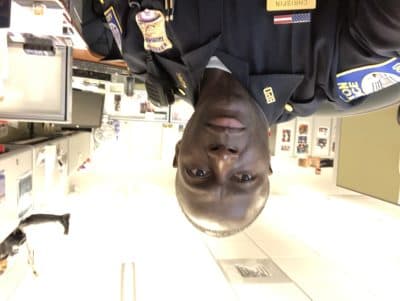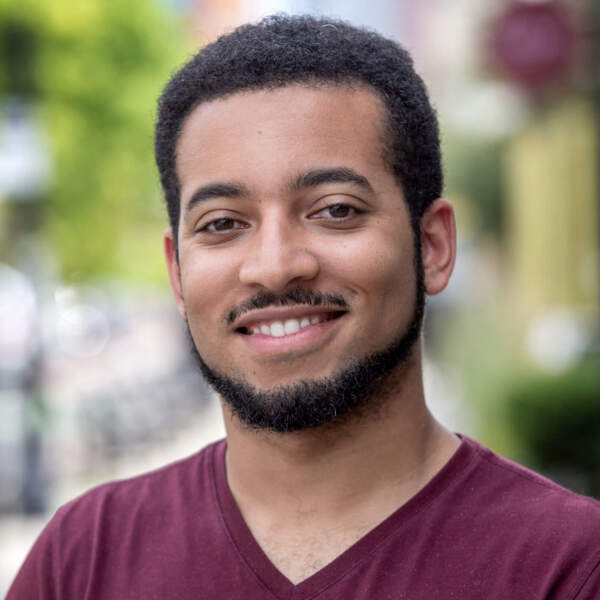Advertisement
Police Officers Of Color Feel Conflicted Amid Anti-Police Brutality Protest Movement

Police departments around the nation are drawing intense scrutiny following the killings of George Floyd and other Black people by police.
Some officers of color say they feel they are in a difficult position when it comes to dealing with anger directed at law enforcement.
They're trying to stay focused on their jobs even as they may share the anger around racist acts perpetrated by police.
Boston Police Sergeant Eddy Chrispin, president of the Massachusetts Association For Minority Law Enforcement Officers, joined WBUR's All Things Considered to share his perspective on being a Black officer and how policing can change for the better.
Here are interview highlights of the conversation, lightly edited for clarity.
Interview Highlights
On being a Black police officer in Boston
"Well, it is incredibly hard. I have to tell you, for a lot of us who joined the police department for the purpose of really improving relationships between the Black community and police officers — a lot of us who grew up in the city — we feel like we are stuck in the middle. I know there's a lot of anger against police officers, and oftentimes it is indiscriminate anger telling us that we're on the wrong side — we're sellouts — not knowing the amount of work that we've done over the years, way before George Floyd.
"For me, I came on the job when I was 30, having been a social worker for DCF (Department of Children and Families), having been a probation officer, having worked at DYS (Department of Youth Services), having a law degree, having done a lot of community work for some time when I was in college. I have a whole different perspective on how to engage people and have conversations and de-escalate situations."
On the current dynamic between police and communities
"I think there is clearly a lot of tension in the air. Just this morning, I was trying to move a young man along who had double-parked, and immediately I could feel the tension. He pushed back and, you know. And now I'm trying to balance, how much do I push to make sure that he's not blocking the lane of traffic in the middle of the morning, and how much do I acquiesce a little bit to kind of pull back so that this doesn't blow up into a major situation where obviously the issue is going to be, well, this black officer's harassing another young black man?

"But on the other hand, I will tell you, like 10 minutes before I had that encounter with a young man, there is a man that I've probably seen often for the last 20 years. And we've had some interactions, not all of which have been positive. He saw a piece I did on TV, and he had seen me interacting with a young woman. He came over. He said, 'Look, I appreciate you. I appreciate that you speak the truth. I know the kind of work that you do out there. I have your back.' There's also that piece of it. And I think we need more people to also step to the forefront and say, look, the people that we're talking about here, there's a lot of officers that are 180 degrees from the kind of officers that people they're pushing up against."
On his feelings watching the protests
"I'm torn. I'm torn because I know the vast majority of our police officers do a good job. And for me, on my end, looking at these protests, I think the vast majority of them wanted to protest peacefully and wanted to send a message. And I was hoping that nobody got hurt. And secondly, I was hoping that the messaging and the protests and the rallies was not being lost by virtue of these people who were looting, rioting and being violent."
On calls to defund the police
"Well, I will say this. I think a lot of the push to reallocate funds — I'm not going to say defund the police, reallocate funds — we've known those problems existed for a long time. We've known there were issues around education in poor communities and Black and brown communities for years. You know, defunding the police is not going to fix all these problems. We know we have to invest more in certain communities. And the other piece I think about is, when you defund the police, are you going to minimize the level of service that we provide? Are we going to have less police officers on the street? And when and if that happens, who is going to suffer the most from less police resources out on the street?"
On racism and other biases in the Boston Police Department
"For me to say we don't have a problem would be disingenuous. I think we do have some problems. I think we have people in this police department who have had very little interaction with people of color and communities of color before they got on the job. And I think for me, the biggest piece about issues of racism, gender bias, homophobia and all those type of things is really for other police officers to police themselves."
So if there are changes that can happen within the police department right now that could be visible. What would they be?
"Conversation, interaction. And those are the things that are at least possible right now, given how much anger and frustration there is out there. The problem is not simply policing. It's the culture that we exist in that we grew up in, that we live in every day. This is not simply a policing issue. It just so happens that policing is the face of all the issues that we have in this country at this point in time."
This article was originally published on June 11, 2020.
This segment aired on June 11, 2020.

